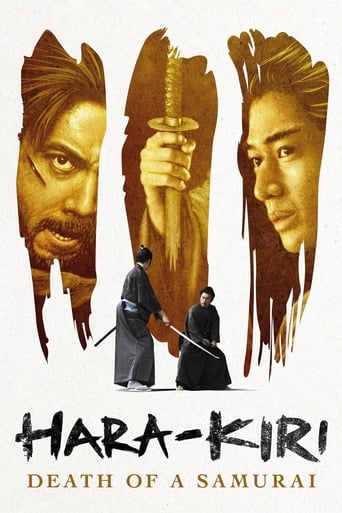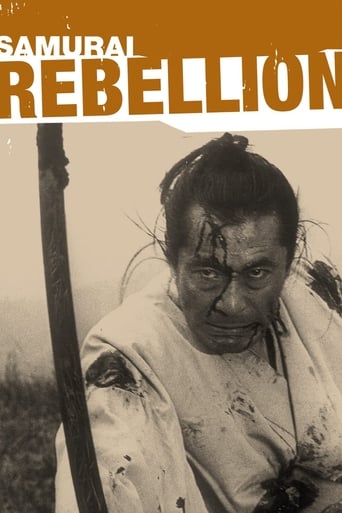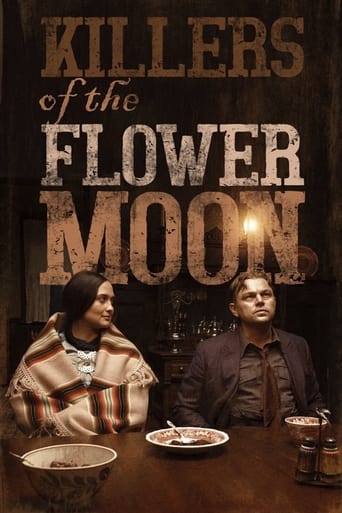Best movies like The Inner Palace Conspiracy
A unique, carefully handpicked, selection of the best movies like The Inner Palace Conspiracy Starring Tsumasaburō Bandō, Kinuyo Tanaka, Isuzu Yamada, Keiji Sada, and more. If you liked The Inner Palace Conspiracy then you may also like: 13 Assassins, Utamaro and His Five Women, Lone Wolf and Cub: The Final Conflict, Taboo, Turtle Geisha and many more popular movies featured on this list. You can further filter the list even more or get a random selection from the list of similar movies, to make your selection even easier.
A period mystery in which an unconventional priest exposes the truth behind the bizarre death of a maid in the shogun's harem. Kinuyo Tanaka stylishly plays a constantly intoxicated geisha in this all-star entertainment film.
You may filter the list of movies on this page for a more refined, personalized selection of movies.
Still not sure what to watch click the recommend buttun below to get a movie recommendation selected from all the movies on this list
Utamaro and His Five Women
Utamaro, a great artist, lives to create portraits of beautiful women, and the brothels of Tokyo provide his models. A world of passion swirls around him, as the women in his life vie for lovers. And, occasionally, his art gets him into trouble.
Lone Wolf and Cub: The Final Conflict
A noble samurai serving the Shogun as 'Kogi Kaishaku-nin' (Official Executioner) is the target of a plot by the evil Yagyu Clan to take away his position and replace him with a member of their own family. When his wife is murdered and evidence is produced that he was plotting against the Shogun the Code of Bushido calls for him and his son to commit sepuku. Instead he defies the Shogun's orders and takes up arms against his enemies, becoming an assassin for hire.
Taboo
Set during Japan's Shogun era, this film looks at life in a samurai compound where young warriors are trained in swordfighting. A number of interpersonal conflicts are brewing in the training room, all centering around a handsome young samurai named Sozaburo Kano. The school's stern master can choose to intervene, or to let Kano decide his own path.
Turtle Geisha
Natsuko is so good at using that super-strong vagina of hers that she can fuck guys to death. In the end, she’s pitted against a sexual superman and a showdown ensues. There’s also a subplot about a mad scientist type who needs vaginal juices to create a potion designed to turn Japanese girls black.
A Tale of Archery at the Sanjusangendo
In A Tale of Archery, young, timid bowmaster Kazuma (Akitake Kôno) seeks to beat the archery record set by Hoshino Kanzaemon, a mysterious figure who, it is rumored, drove the previous champion (Kazuma’s father) to suicide. Possessed of much raw talent, Kazuma is also very much a coward, holing himself up in an inn run by the kindly Okinu (Kinuyo Tanaka) and generally avoiding confrontation of any sort. Despite his clandestine manner, enough of the locals know of Kazuma’s purpose and an attempt is made on his life. He is saved by Karatsu Kanbei (Kazuo Hasegawa), a samurai who offers to help Kazuma hone his archery skills, though it soon becomes clear that this apparently selfless stranger has several potentially shady ulterior motives.
Hara-Kiri: Death of a Samurai
A tale of revenge, honor and disgrace, centering on a poverty-stricken samurai who discovers the fate of his ronin son-in-law, setting in motion a tense showdown of vengeance against the house of a feudal lord.
The Hidden Blade
Set in 19th Century Japan a young samurai who finds himself in love with a farm girl leaves his home to begin a new life. He has to take stock of his new life when he is put to the test and ordered to kill a traitor who just happens to be his dearest friend.
The Life of Oharu
In Edo Period Japan, a noblewoman's banishment for her love affair with a lowly page signals the beginning of her inexorable fall.
Love Letter
A sad and troubled man finds a new job five years after the end of WWII, where he writes love letters for other people.
Samurai Assassin
Japan, 1860. The men of the Mito clan, victims of the Ansei purge, anxiously prowl around the Sakurada Gate of Edo Castle with the intention of assassinating Naosuke Ii of Hikone, tairō of the Tokugawa shogunate and responsible for their misfortune.
Samurai Rebellion
The mother of a feudal lord's only heir is kidnapped away from her husband by the lord. The husband and his samurai father must decide whether to accept the unjust decision, or risk death to get her back.
The Scent of Incense
After her mother runs away from home, Tomoko is raised to be a geisha. One day Tomoko meets her mother in a red-light district in Tokyo and her life deeply gets in trouble.
Sekigahara
The background to and depiction of a watershed battle in Japanese history, at Sekigahara in 1600, when Tokugawa Ieyasu's Army of the East defeated the Army of the West of Ishida Mitsunari. The story includes the intrigues and shifting loyalties of the various retainers, family members, and samurai.
Shogun's Shadow
A shogun's eldest son must do whatever it takes to survive a series of attempts on his life. He receives much-needed aid from seven warriors who are led by a strong leader.
Hot Springs Geisha
A look at the lives of a troupe of geishas working in a small seaside resort town. For the most part, their lives consist of greeting boatloads of oversexed businessmen and providing bawdy entertainment through the evening followed by private companionship at night, interspersed with occasional catfights with the rival geisha house. Their routine is suddenly thrown off by the appearance of an abandoned baby in the geishas' dormitory, followed by its disappearance only a short time later. Who could be responsible for such a thing?
Woman of Rumor
Yukiko's fiance learns her mother runs a geisha house and ends their engagement. She despises what her mother does until one of her clients shows interest and starts to woo her.
Sleepy Eyes of Death 12: Castle Menagerie
Just when you think Kyoshiro's life can't get any stranger, someone starts running around raping and murdering, and leaving notes proudly proclaiming that he did it. Tracking down the real culprit willtake him along a twisted trail that involves the Shogun's harem, hidden christians, and positively pregnant politics!
Ninja's Mark
When the Shogun Tokugawa III is in bed with a girl, she turns into a monster. The court believes she is Ninja Magic, used to frighten the lord off women so that there will be no heir. Tôma, a famous swordsman, is called in and exposes the Ninja, even discovering their leader, a beautiful young girl named Kagiroi. Guessing that she is the daughter of some ousted daimyo anxious to get back into favor, he is about to unmask her when he is taken prisoner...
Sword of Desperation
A talented but troubled Edo Period swordsman, Kanemi Sanzaemon. Three years earlier, Kanemi killed a woman, Renko, the corrupt mistress of the powerful daimyo Tabu Ukyou. Unexpectedly, Kanemi received a lenient sentence for his crime and is allowed to return to his clan after only one year of imprisonment. Following his return, Kanemi is faced with the death of his wife, Mutsue. Thereafter, Kanemi lives with and cares for his wife's niece, Satoo, who has secret affections for Kanemi and expresses them by helping change his bleak outlook on life. Meanwhile, Kanemi's develops his unique "bird-catching" sword technique which he will soon put to test in battle for the first time against the fearsome swordsman, Hayatonosho Obiya.
Bandits vs. Samurai Squadron
Kumokiri Nizaemon, a former samurai warrior, has abandoned his class to become the leader of a gang of thieves. He leads his outlaws in an attempt to rob the castle of his former clan.
Sleepy Eyes of Death 3: Full Circle Killing
A decapitation at the hands of the shogun's monstrous misbegotten son kicks off the action and draws nomadic Nemuri Kyoshiro (Raizô Ichikawa) into more sword-fighting adventures when he's blamed for the beheading. Meanwhile, the head-chopper's mother is busy knocking off the shogun's lawful heirs to secure the shogunate for her son.
13 Assassins
In between the original 1963 13 ASSASSINS film and the 2010 remake by Miike Takashi, Fuji TV produced a version for TV. Starring Nakadai Tatsuya and Natsuyagi Isao, with strong support from Tanba Tetsuro and Tanaka Ken, this is the ultimate tale of samurai justice carried out in a historical masterpiece. The shogun’s half-brother, Matsudaira Naritsugu has been slated to join the Roju Council of Elders as a senior adviser even though he is criminally insane. His outrageous acts cause one of his top retainers to commit ritual suicide in protest over his lord’s crimes. Alerted to these crimes, Roju Councilor Doi asks Inspector General Shmada Shinzaemon to assassinate Naritsugu before he can be seated on the council. Gathering a band of 13 (including himself), Shimada sets out on a death-defying journey to cut down the lord before he can reach Edo. Can a band of 13 samurai defeat the vile Naritsugu’s 200 man entourage and enact justice against his cruelty?
Detective Umon's Diary, Story No. 6
An important silent film survives, Kumahiko Nishina's Umon torimonocho rokuban tegara jinenji kidan (The Samurai Detective, aka The Detective Records of Umon, aka Detective Umon Diary: Exploit Number Six, 1930). Umon on his shining white horse stops a conspiracy against the Shogun. Umon was played by Kanjuro Arashi in this early film, & long after in the post-Occupation jidaigeki revival he reprised the role in Kajiro Yamamoto's Muttsuri Umon torimonocho (1955), helping to launch the renewed interest in such films.
Why Didn't They Ask Evans?
This intriguing story is set in the 1930s at a country house, where two amateur sleuths, Bobby Jones and Lady Frankie Derwent, try to unravel the mystery behind a tale of murder, suspense and false identities. And the only clues the two have to go on are the puzzling last words of a dying man. Featuring characters created by Agatha Christie, Why Didn't They Ask Evans is a classic crime thriller sure to please murder-mystery fans.
Women of the Night
Fusako, a drug dealer's young mistress in postwar Japan, loses her tenuous grasp on life upon learning about her lover's affair.
Flowing
Otsuta is running the geisha house Tsuta in Tokyo. Her business is heavily in debt. Her daughter Katsuyo doesn't see any future in her mother's trade in the late days of Geisha. But Otsuta will not give up. This film portraits the day time life of geisha when not entertaining customers.
Woman of Tokyo
Ryoichi and Chikako, brother and sister, live together. Chikako toils during the day and, at night, prostitutes herself to fund his college tuition.
Ginza Cosmetics
A luckless geisha struggles to make a living for herself and her young son.
Love Under the Crucifix
The basic story in Love under the Crucifix is about Ogin, daughter of a tea master, who are both Christians in feudal Japan. Ogin falls in love with a feudal prince, also a Christian who is already married, and that creates problems. Further, when the Shogun bans Christianity, the situation worsens.
A Wanderer's Notebook
Considered one of the finest late Naruses and a model of film biography, A Wanderer’s Notebook features remarkable performances by Hideko Takamine – Phillip Lopate calls it “probably her greatest performance” – and Kinuyo Tanaka as mother and daughter living from hand to mouth in Twenties Tokyo. Based on the life and career of Fumiko Hayashi, the novelist whose work Naruse adapted to the screen several times, A Wanderer’s Notebook traces her bitter struggle for literary recognition in the first half of the twentieth century – her affairs with feckless men, the jobs she took to survive (peddler, waitress, bar maid), and her arduous, often humiliating attempts to get published in a male-dominated culture.
Two Portraits of MIYAGINO
In Edo-era Japan, a ukiyo-e artist languishes in his master’s shadow. Creatively stifled, he finds consolation in the company of a prostitute, and becomes entangled in a love triangle. A mystery emerges involving two portraits and the sudden disappearance of the artist Sharaku. Helmed by Cannes-selected director Tatsuji Yamazaki, the film employs kabuki-inspired sequences and stylised sets.
The Blonde in Edo Castle
A concubine is exiled from the Shogun's harem after she is found guilty of having tried to smuggle a kabuki dancer into the palace for the purpose of an illicit affair. Another conubine believes she has been framed and keeps investigating.
Love's Twisting Path
Set in Kyoto in the last days of the Edo Period, the bloody conflict continues between local feudal domains, which aim to overthrow the Tokugawa Shogunate, and the Shogun's police and city patrol. Tajuro Kiyokawa, once the master of the sword but now a depraved samurai who left his domain putting aside his past ambition, barely makes ends meet. Toyo, a woman who runs a tavern next door, feels affection for Tajuro who guards her place against nasty customers, but he never realizes Toyo's feelings.
Chikamatsu's Love in Osaka
The adopted son of an Osaka courier falls in love with a prostitute and, discovering that she is about to be purchased by a client, steals money from his employer to redeem her. Hunted criminals, the two young lovers take flight to Yamato, but, as in Chikamatsu's other domestic tragedies of love and duty (known as sewamono), they must be pursued and their passion destroyed by death. Favourite Uchida themes, such as the indenturing of a prostitute (cf. YOSHIWARA; A BLOODY SPEAR AT MT. FUJI), and his characteristic emphasis on performance and theatrical artifice re-emerge here; but the daring device of having Chikamatsu appear as a character - not unlike having Shakespeare interpolated into a film adaptation of one of his plays - is just one of many surprises this remarkable film holds. “Extraordinary” (Donald Richie).














































13 Assassins
A sadistic Daimyo (feudal lord) rapes a woman and murders both her and her husband, but even when one of his own vassals commits suicide to bring attention to the crime, the matter is quickly hushed up. Not only will there be no punishment, but because the Daimyo is the Shogun's younger brother, he will soon be appointed to a high political position from which he could wreak even more havoc. Convinced that the fate of the Shogunate hangs in the balance, a plot is hatched to assassinate the Daimyo. The two most brilliant strategic minds of their generation find themselves pitted against each other; one is tasked to defend a man he despises, and has a small army at his disposal. The other is given a suicide mission, and has 12 brave men. They are the 13 Assassins.